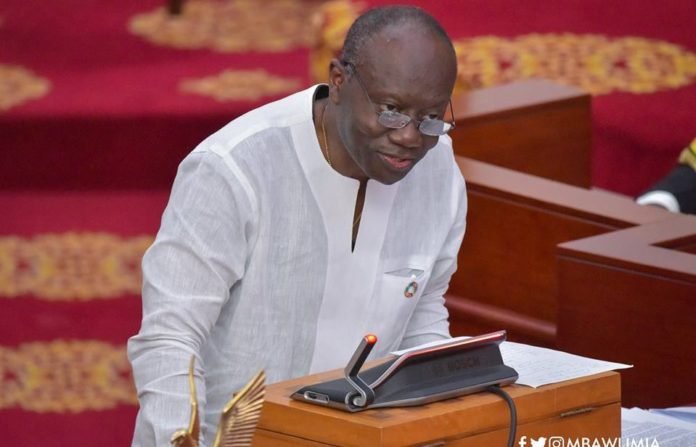
Ghana’s ambition to cut back a suffocating US$2Billion annual food import bill to give some respite to the Cedi; has found ample expression in the country’s 2024 budget delivered by Finance Minister Ken Ofori Attah.
In lay sense, what appears on your dining table and where it appeared from will matter how the Ghana cedi fares after the 2024 fiscal year.
The cedi has suffered a cumulative depreciation of 25% between January and September 2023; a downward thumping the government applauds as relative stability compared to previous worse performing years.
The agrarian programs contained in the last major budget of the Nana Akufo Addo administration delivered before law makers on Wednesday, dwelt heavily on the twin pillars of achieving food security and easing pressures on the Ghana cedi
It has become important for the West African Country which runs its heavily import dependent economy on an annual US$14 billion bill, to begin taking these crucial steps to save a local currency left at the mercy of every global forex tide.
Ghana’s friendly climate coupled with a wide coastal line and an arable land size which stood at 4,709 thousand hectares by 2021, is the envy of the many nations where Ghanaians travel to buy rice, vegetables, cooking oil, fish and meat products, cereals, poultry and sugar.
Under the broad headline, “Improving Agriculture Production and Productivity,” Ken Ofori Attah reiterated the cardinal role of government’s flagship Planting for Food and Jobs which has entered its second phase of implementation with a broader focus beyond the farm gate through to every player along the value chain.
The finance minister reiterated the broadened scope of the program which considers input credit; marketing, offtake arrangements, aggregation, storage and value addition.
Poultry Production
Demand for Chicken as a major source of animal protein in Ghana stands at 460 thousand tons with an estimated annual per person consumption of 13kg according to data provided by Veterinaria Digital magazine.
As at 2022, the country could locally produce 50 thousand tons of chicken amidst high cost of production and eventual uncompetitive pricing leaving the huge gap to be filled by imports
Ghana spent about US$721 million shipping down chicken and fish into the country, between 2017 and 2020 alone, with its attendant toll on the Ghana cedi.
Addressing law makers, the Finance Minister pointed out that government has selected 15 anchor farmers with some 500 out growers in selected regions to prosecute the government’s agenda for food sufficiency in poultry products.
He explained, “The PfJ has a special focus on poultry to address the heavy reliance on imports. Accordingly, Fifteen (15) anchor farmers and 500 out-growers in 5 regions (Ashanti, Greater Accra, Bono, Bono East and Eastern regions) will be selected to produce 65,000 MT of broilers in 2024.”
In line with the Dakar II Summit resolutions; the Akufo Addo government pledged some US$541 million in March, to increase Ghana’s poultry meat production to some 450 thousand tons
This will not be the first time the sector is receiving pledged supports for comprehensive programs with little to show for it.
In the year 2020, the state run Agricultural Development Bank announced a GHS500 million investment for the poultry industry.
The investment was slated to boost production in hatcheries, growing of birds, meat processing, marketing, cultivating of grains and feed production.
The project was launched in collaboration with the Bank of Ghana, the Ghana Incentive-based Risk Sharing System for Agricultural Lending (GIRSAL) and the Out-grower and Value Chain Fund (OVCF).
In the year 2014; the Ghana Broiler Revitalization project was launched to produce at least one million birds as part of the pilot project.
GHC39million was slated to be sunk into the project that was to ultimately create a 40% share of locally produced and processed chicken to incrementally compete with the cheaper imported frozen chicken.
Vegetable Imports
The finance minister Ken Ofori Attah further described as urgent, the need for Ghana to take hold of local production of vegetables which currently begs the huge local demand.
Ghana went panicking when the Niger Coup D’états and its resultant closure of borders held up Ghana bound trucks loaded with tons of onions imported from the Sahelian region.
In 2022, demand for onions in Ghana was 314,337 MT, while the local production was 178,492 MT.
Globally, Ghana is the 42nd largest importer of onions hauling in $33.1M worth of the vegetable in the year 2021 alone.
If a Ghanaian had onions on their plates, it must have come from Niger where the country spends $21.7M importing onions or from China ($8.83M), Netherlands ($928k), Morocco ($695k), and Nigeria ($550k).
The national demand for tomatoes in 2022 was estimated to be 1,257,348 MT, while local production stood at 468,280 MT.
Trade data from the Ghana Vegetable Producers and Exporters Association (Ghana Vegetables) indicates that Ghana crossed the annual US$400 million tomato import from neighboring Burkina Faso as far back as 2018.
To reverse these debilitating trends and its impact on the cedi; the finance minister stated that the perennial challenges of post-harvest losses, lack of fertilizers and other inputs, irrigation and inadequate storage facilities will be comprehensively dealt with.
“PfJ 2.0, therefore, seeks to improve supply and utilization of high-quality inputs, facilitate credit guarantees for Aggregators to procure improved seeds, fertilizers, and pesticides and supply them on zero-interest credit terms to vegetable farmers in the immediate and short-term,” he read.
Fish Production
Ghana sources the largest of its fish stock from the country’s wide marine coastal regions complimented by lagoon, inland freshwater sources and aquaculture.
While the sea has been over exploited in unsustainable fishing practices, inland water sources have suffered pollution from illegal mining and improper waste management dwindling annual fish stock significantly.
Out of the total 1.2 million metric tons of annual demand for fish, Ghana’s annual local fish production can barely cater for half, with a production of 600,000 metric tons.
The government plans in the 2024 budget and economic policy statement, to tackle all these sectors providing gear and investments for aquaculture while ensuring that marine fisher folk are not hindered by any shortages and illicit trading activities in the supply of premix fuel.
Ken Ofori Attah outlined, “Mr. Speaker, the Growth Strategy also aims to boost fish production, mostly through increased focus on oceanic and inland earthen ponds.”
He added, “The goal is to support fishermen, fish farmers, and fish processors in our coastal regions. The interventions planned in this sub-sector include direct support for production, distribution, and storage of fish as well as producing and supplying over 110,700,000 litres of Premix fuel using gasoline and condensate.
President Nana Addo Dankwa Akufo-Addo indicated that Ghana spends US$200 Million annually importing fish when he participated at the One Ocean Summit, held in Brest, France, upon the invitation of Emmanuel Macron, President of the French Republic.
Rice Production
Rice has over the years become a major staple in Ghana although local farmers and processors can only produce to meet 30% of the country’s 1.5 million metric tonne demand.
Placing third in Ghana’s highest imported commodities, Ghana imported a $552Million value of Rice in the year 2021 ranking the country the 13th largest importer of Rice in the world.
The Ghanaian government is on course to tap into this huge market blocking out three economic enclaves spanning over a 110,000 acres with a projected 160,000mt of rice by the end of 2024.
- “As of December 2022, three enclaves in Kasunya (Greater Accra), Kumawu (Ashanti) and Banda (Oti Region) were operational. Five (5) other enclaves are planned in 2024 to promote value addition, integration, and deepening aggregation and value chain systems to serve as economic ‘growth poles’” Ken Ofori Attah enumerated.
Forex Benefits:
These initiatives hold significant benefits for the country if realized.
No country can claim to be independent if it looks to other countries and availability of another country’s currency to import what it feeds to survive.
Food security with its consequent rewards of a stable currency is the least that any developing country like Ghana should be aiming towards.
Any time Ghana spends a dollar importing food, we create jobs and economic expansion for other developed economies, depreciate our cedi and aggravate poverty in the country.
It is unpardonable for this unconscionable trend to continue when God has blessed Ghana with huge arable lands; abundant marine and fresh water and an energetic, resourceful young population with a mean age of 20.2 years.
Ghana could give itself some fiscal space to maneuver its way catering for other commodities which it cannot comparatively and competitively produce on its own soil if these completely doable local steps are taken to wean itself from importation of these basic food commodities.
Source: Ghana/Starrfm.com.gh/103.5FM/Ivan Heathcote – Fumador



